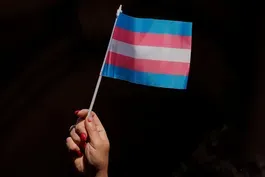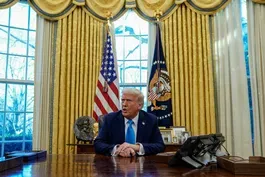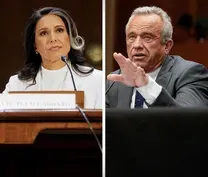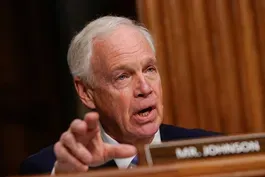
The history and legacy of birthright citizenship in the U.S.
Clip: 2/4/2025 | 8m 35sVideo has Closed Captions
The history and legacy of birthright citizenship in the U.S.
On his first day in office, President Trump signed an executive order to end universal birthright citizenship and limit it at birth to people with at least one parent who is a permanent resident or citizen. A federal judge put the order on hold, but if upheld, Trump’s move could upend a 120-year Supreme Court precedent. Stephanie Sy reports on the history and legacy of that case.
Major corporate funding for the PBS News Hour is provided by BDO, BNSF, Consumer Cellular, American Cruise Lines, and Raymond James. Funding for the PBS NewsHour Weekend is provided by...

The history and legacy of birthright citizenship in the U.S.
Clip: 2/4/2025 | 8m 35sVideo has Closed Captions
On his first day in office, President Trump signed an executive order to end universal birthright citizenship and limit it at birth to people with at least one parent who is a permanent resident or citizen. A federal judge put the order on hold, but if upheld, Trump’s move could upend a 120-year Supreme Court precedent. Stephanie Sy reports on the history and legacy of that case.
How to Watch PBS News Hour
PBS News Hour is available to stream on pbs.org and the free PBS App, available on iPhone, Apple TV, Android TV, Android smartphones, Amazon Fire TV, Amazon Fire Tablet, Roku, Samsung Smart TV, and Vizio.
Providing Support for PBS.org
Learn Moreabout PBS online sponsorshipAMNA NAWAZ: What makes a U.S. citizen?
An executive order signed by President Trump aims to end a 127-year-old precedent clarifying universal birthright citizenship.
Instead, the president is aiming to fulfill a campaign promise to limit citizenship at birth to people with at least one parent who is a permanent resident or U.S. citizen.
GEOFF BENNETT: That order is on hold until a court hearing on Thursday.
Stephanie Sy reports now on how -- the history and the legacy of birthright citizenship.
STEPHANIE SY: Over pork buns and tea, the Wong family welcomed the lunar new year with what they see as unwelcome news.
WOMAN: I won't say it wasn't a surprise, but it happened so quickly.
NORMAN WONG, Descendant of Wong Kim Ark: It's frightening, actually.
DONALD TRUMP, President of the United States: Birthright, that's a big one.
STEPHANIE SY: President Trump's attack on birthright citizenship hits home for Norman Wong and his sister Sandra.
NORMAN WONG: I'm proud of what my great-grandfather Wong Kim Ark did, because he stood up.
STEPHANIE SY: It was their late relative Wong Kim Ark whose fight for birthright citizenship led to a pivotal 1898 Supreme Court case.
Law Professor Amanda Frost details Wong Kim Ark's story in her book "You Are Not American."
AMANDA FROST, Author, "You Are Not American: Citizenship Stripping from Dred Scott to the Dreamers": He was born in the United States.
And the government, they argued that he was not, in fact, a citizen of the United States.
STEPHANIE SY: Wong Kim Ark was born in San Francisco's Chinatown in the early 1870s.
His parents were merchants who were living in the country legally.
As a result of the 14th Amendment to the Constitution ratified just a few years earlier, he was by virtue of birth an American citizen.
AMANDA FROST: The first sentence of the 14th Amendment provides that all persons born or naturalized in the United States and subject to the jurisdiction thereof are citizens of the United States.
And that clause very simply was intended to ensure that everyone born on U.S. soil is a citizen, with minor exceptions.
STEPHANIE SY: The primary goal of the amendment was to overrule the Supreme Court's infamous Dred Scott decision, which held that no Black person, free or enslaved, could be a citizen of the United States.
AMANDA FROST: The Reconstruction, Congress and the nation post-Civil War, post-slavery said, no, we need to end that.
We need to integrate the Black residents of our country fully into our country as equal members.
STEPHANIE SY: And Frost says it deliberately applied to the children of immigrants born on American soil.
AMANDA FROST: This was also explicitly discussed.
The Reconstruction, Congress and the nation knew that birthright citizenship would apply equally to the children of all immigrants.
STEPHANIE SY: By the late 1800s, Chinese immigrants were vilified, in part due to an economic downturn and rising unemployment among white Americans.
Anti-Chinese sentiment was enshrined by the federal government in the Chinese Exclusion Act.
In August 1895, government officials sought to take this a step further.
AMANDA FROST: They were looking for a test case to challenge birthright citizenship.
They specifically and very clearly wanted to challenge it for the children of Chinese immigrants, and they chose Wong Kim Ark.
STEPHANIE SY: Then a cook working in San Francisco, Wong was prevented from reentering the country after a visit to China.
NORMAN WONG: He had proper papers.
They just didn't want him in.
STEPHANIE SY: The government denied he was a citizen by birth, at least in part because of his race, language, color and dress.
With support from Chinese community groups, Wong appealed to the Supreme Court.
NORMAN WONG: By himself, he couldn't have done it.
The fact that there were other people that stood up alongside with him made a difference.
STEPHANIE SY: In 1898, the court decided 6-2 in his favor in a landmark judgment.
AMANDA FROST: The text of the 14th Amendment speaks in universal terms and does not make any distinction based on race.
It says all persons born are citizens.
It's why the Supreme Court upheld that provision for Wong Kim Ark.
Even if they didn't believe in the sentiment, they couldn't deny the scope of the text.
STEPHANIE SY: Today, Wong Kim Ark is seen as an Asian American pioneer.
The court's decision paved the way for generations of children to become citizens.
NORMAN WONG: I'm a product of these laws.
So if those laws were never here, I probably would never get born.
It's amazing that they caught them.
This is mom, Kimiko Takayuchi (ph).
STEPHANIE SY: For the Wongs, President Trump's executive order also brings back much more recent family history on their mother's side.
NARRATOR: The beginning of America's war with Japan opened very badly for America's Navy.
STEPHANIE SY: In the aftermath of the Pearl Harbor attack, an executive order by President Roosevelt authorized the incarceration of more than 70,000 Japanese Americans.
That included the Wongs' mother, who was only 16 years old at the time, pictured here with her family waiting for a bus to take them to a detention facility.
Decades later, the government would apologize and offer survivors reparations.
RONALD REAGAN, Former President of the United States: No payment can make up for those lost years, for, here, we admit a wrong.
Here, we reaffirm our commitment as a nation to equal justice under the law.
STEPHANIE SY: With a family's story rooted in challenges to citizenship, Norman Wong worries that this struggle will carry on to the next generation.
His granddaughter is half Asian American, half Mexican American.
NORMAN WONG: I really think that this effort, latest effort, it's actually directed against the people of Latin America and Mexico.
J.D.
VANCE, Vice President of the United States: America should actually look out for the interests of our citizens first, and that means if you're here permanently and lawfully, your kid becomes an American citizen.
If you're not here permanently, if you're not subject to the jurisdiction of the United States and don't plan to be, why would we make those people's children American citizens permanently?
STEPHANIE SY: Whether children born to undocumented or temporary immigrants are subject to the jurisdiction of the U.S. is the crux of the Trump administration's argument.
But that clause of the 14th Amendment has only ever been applied to exclude two groups, says Professor Amanda Frost, the children of foreign diplomats and, until a federal law in 1924, children born into Native American tribes.
AMANDA FROST: So that phrase clearly does exclude those very unusual, narrow groups of people.
And undocumented immigrants are fully subject to U.S. jurisdiction.
All of the laws and policies of the U.S. apply to them.
If they violate a traffic law, they're fined or jailed just like the rest of us.
The Supreme Court rejected that argument in 1898, and I still don't see its logic today.
STEPHANIE SY: Besides, Frost says, birthright citizenship is a fundamental American value that makes the country stronger.
AMANDA FROST: The United States is unusual in our ability to integrate new immigrants and the children of immigrants.
Other countries don't do that nearly as well as we do.
Children of immigrants thrive in America, and I think they're one of the reasons that America is an economic superpower.
STEPHANIE SY: And a military one.
At the same time that Norman Wong's mother was in a Japanese intern camp, his father, whose right to citizenship had been guaranteed by Wong Kim Ark's legal victory, was serving the U.S. Navy in World War II.
So, what has the experience of your family, your great-grandfather, your mother, what has it taught you about the American experience?
NORMAN WONG: I say, if you're here, we're all Americans.
It should be a dream, not a nightmare.
I think we're turning this country into one side gets to dream, the other side gets just fear.
The American experience is what we create.
And that creation wasn't fixed in stone.
STEPHANIE SY: The bedrock has been shaken before, and the fight over what it means to be American is not over.
For the "PBS News Hour," I'm Stephanie Sy.
ACLU sues Trump over trans youth health care restrictions
Video has Closed Captions
ACLU sues Trump administration over trans youth health care restrictions (5m 51s)
China responds to Trump with retaliatory tariffs
Video has Closed Captions
China responds to Trump with retaliatory tariffs and Google antitrust probe (4m 16s)
Committees clear path for Gabbard, RFK Jr. confirmations
Video has Closed Captions
Senate committees clear path for confirmations of Gabbard and RFK Jr. (5m 44s)
Netanyahu 'an impediment’ to release, hostage's niece says
Video has Closed Captions
‘Netanyahu was an impediment’ to getting uncle released sooner, niece of hostage says (7m 51s)
News Wrap: Around 10 people killed in shooting in Sweden
Video has Closed Captions
News Wrap: Around 10 people killed in mass shooting at education center in Sweden (5m 33s)
Nir Oz begins long process of rebuilding from Oct. 7 attacks
Video has Closed Captions
Nir Oz begins long process of rebuilding from Oct. 7 attacks (6m 56s)
Sen. Johnson says Musk's USAID closure 'tip of the iceberg'
Video has Closed Captions
GOP Sen. Johnson says Musk's dismantling of USAID is 'just the tip of the iceberg' (7m 58s)
Providing Support for PBS.org
Learn Moreabout PBS online sponsorshipMajor corporate funding for the PBS News Hour is provided by BDO, BNSF, Consumer Cellular, American Cruise Lines, and Raymond James. Funding for the PBS NewsHour Weekend is provided by...



















